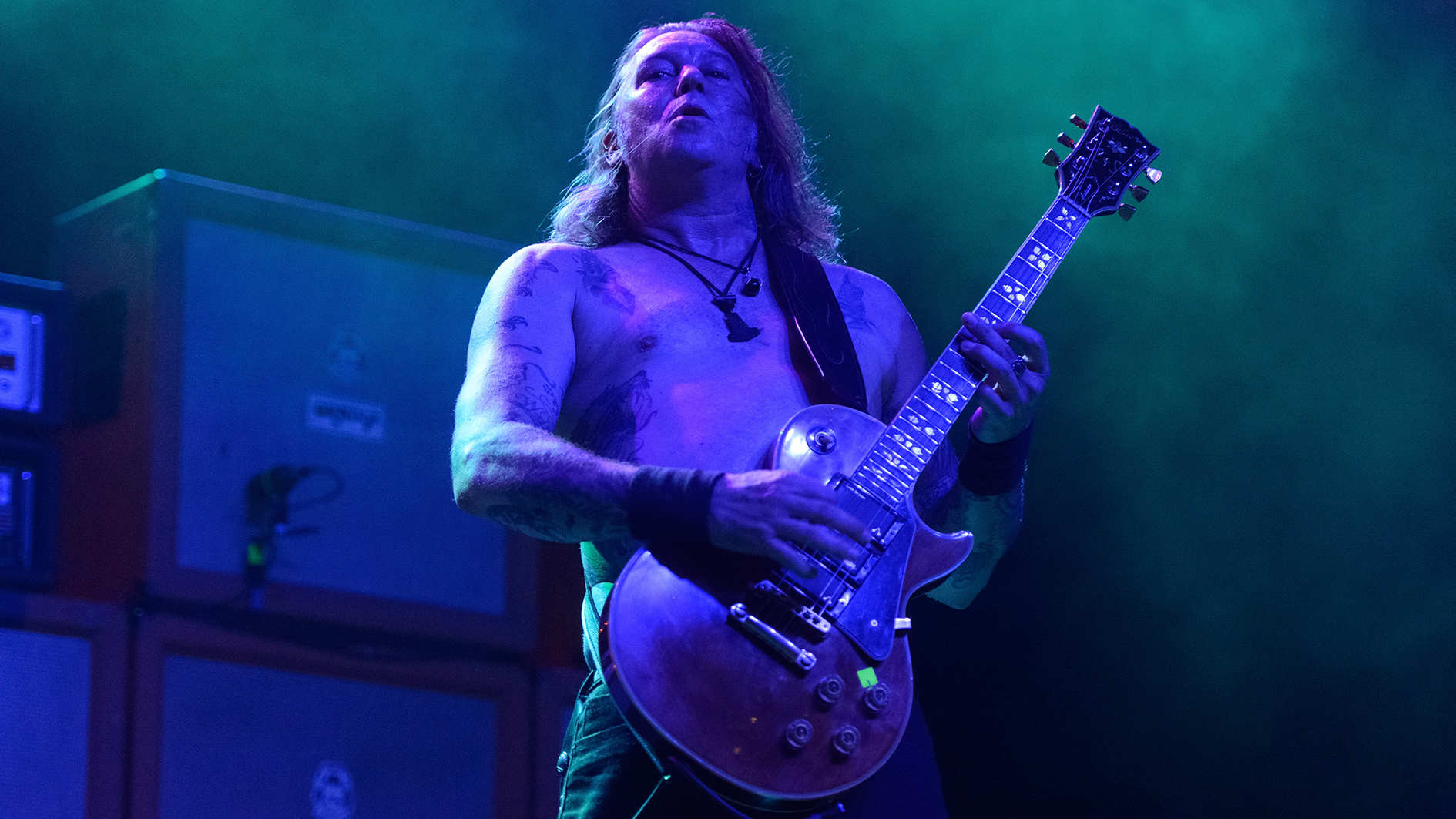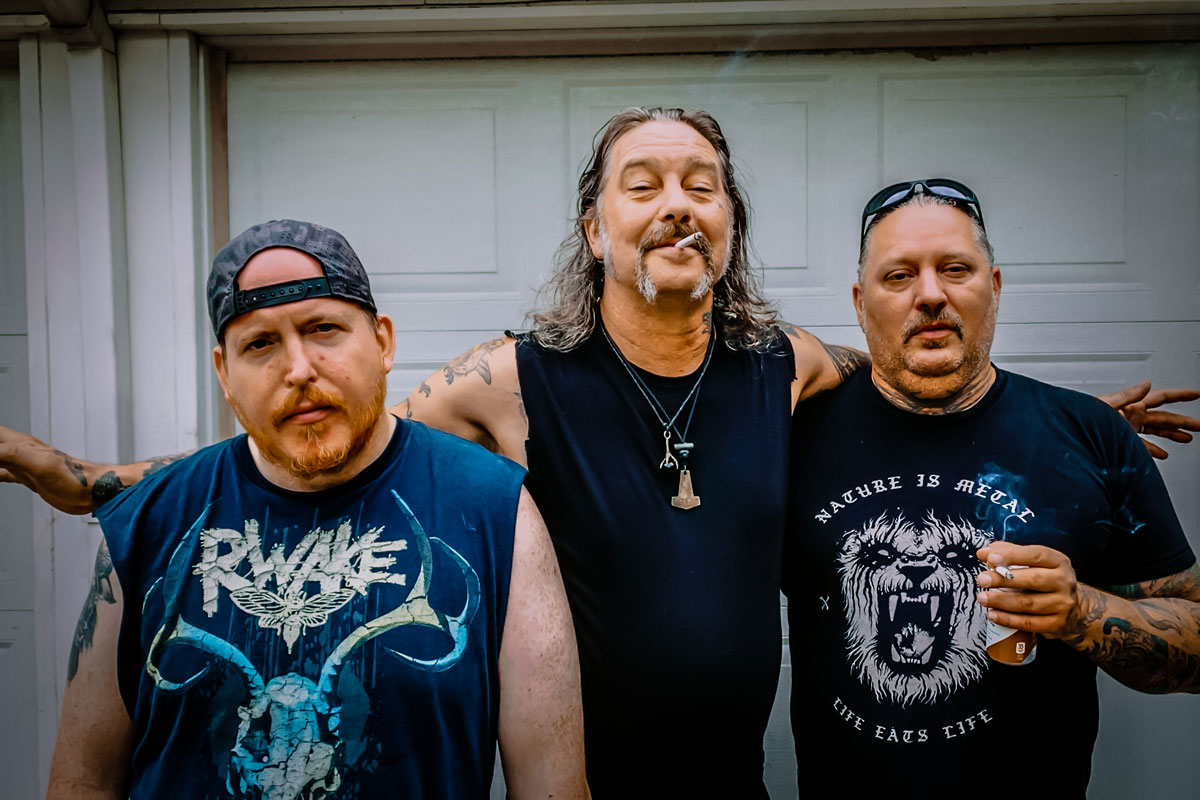Matt Pike: “I wanted this album to sound different to my previous work. But everything I play on is going to sound like me, in a weird way, shape or form”
The Sleep/High On Fire guitarist on his love of Les Pauls, and recruiting the likes of Brent Hinds, Todd Burdette and Jeff Matz for his debut solo album, Pike vs The Automaton

All the latest guitar news, interviews, lessons, reviews, deals and more, direct to your inbox!
You are now subscribed
Your newsletter sign-up was successful
The term ‘riff lord’ is arguably one that’s thrown around a little too loosely in this day and age. Not, however, when used to describe Matt Pike – the man who took doom music to new levels of heaviness in Sleep and won a Grammy in 2019 for his work with High On Fire.
His track record for writing earth-rumbling riffs has made him a modern-day equivalent to Tony Iommi – and much like the Black Sabbath legend himself, Pike’s ideas carry a galactic weight strong enough to have their own orbit.
This year he releases his debut solo record, brilliantly titled Pike vs The Automaton, via MNRK Heavy, the label which rebranded from eOne Heavy in September last year.
Recorded over the past year or so, with the pandemic and lockdowns killing off an overwhelming majority of tour dates across the world, Pike describes the new music as a stroke of good luck that haphazardly arrived while the music industry was licking its deep wounds, of which there were many…
“Covid has been a weird time for everything,” he admits. “With all the lockdowns, plus all these Californian fires, I wasn’t getting together with people like I used to. But I had one friend called Jon Reid who was coming over a lot. We saw each other frequently even during lockdowns, jamming on just drums and guitar. We started getting some songs under our belt. It just went from there…”
The album also features some special guests, including Mastodon’s Brent Hinds on the track Lands, Todd Burdette from Tragedy on Throat Cobra and High On Fire bandmate Jeff Matz, who performed the Turkish electric saz heard on the album’s 11-minute closer Leaving The Wars of Woe. It was a surprisingly collaborative experience for a solo debut, explains the stoner metal legend.
“I started asking other people who might want to play on it,” Pike continues, “to focus on the strength of whatever instrument they played or whatever we were looking for. And I really made sure the tunes I’d written played to those strengths, making the right foundation to crisscross through all kinds of ideas. It was a lot of fun and kept me busy and out of trouble.
All the latest guitar news, interviews, lessons, reviews, deals and more, direct to your inbox!
“The studio would close for a bit, then open up again, so I’d work on three songs. Then it would close, and when it reopened I’d finish another three songs…”
Did this being your first solo album affect your approach to guitar leads at all?
“I think so. I took inspiration from my own guitar heroes, experimenting with the music that I liked, coming up with my own versions of it. For example, the first solo you hear on the record is supposed to be what would happen if Brian May played on that track for me… because I couldn’t actually get him to do it [laughs]! So I just did it myself.
“There’s another song called Trapped in a Midcave, where I wanted a Michael Schenker kind of solo, which doesn’t sound anything like what I’d normally do. I think he’s definitely underrated as a guitar player. He has this strange diatonic Mixolydian thing going on. I love his shapes and runs.
Give Brent Hinds a banjo and he’ll blow your mind. Give him a guitar, he’ll blow your mind. Give him anything and he’ll blow your mind
“I think I kinda nailed it in one take, though I didn’t analyze it too much. I remember everyone else if should I do a couple more versions and they were like, ‘Nah, you’re done!’ They wouldn’t even let me double it. Sometimes less is more, just get it done and move on to the next thing.”
Roping in Brent Hinds for Lands was a great move – he’s an incredible soloist, thanks to his mix of shreddy blues and chicken pickin’.
“He’s straight off the porch in Alabama. That’s what he sounds like… it’s the real deal! Give that man a banjo and he’ll blow your mind. Give him a guitar, he’ll blow your mind. Give him anything and he’ll blow your mind. He took the first solo on a song and it was so good I told him to keep on playing through the song, even over the parts with singing.
“He did some lap steel and slide, as well as this other Billy Gibbons-style solo. I was sat there thinking, ‘Fuck you! Really, man?!’ I had to go back and make my own guitar tones better, re-amping DIs and all the rest, just because he sounded so incredible. He did all his stuff at Mastodon’s studio. I think it gave all of us something to do.”

That song also showcases a softer side of you. How exactly did you write it?
“Yeah, it’s different. I was jamming on a 12-string and Jon started playing along, not hitting his drums very hard. We were really liking where the music was headed. There were actually a couple of other tracks like that, we were going to have more of that on this album and I’d like to do more in the future. I’d like do more with Brent, too!
“The song is about this fuckin’ bad guy who is an asshole. You know how in the movies, the bad guy has his redemption moment where he comes to light? Well, in this story, it doesn’t happen. He just fuckin’ dies with no glory after a cheap life as a total piece of shit. That’s why the song ended up sounding like that.”
I tried to mix it up a bit because I wanted this album to sound different. But essentially everything I play on is going to sound like me, in a weird way, shape or form
Most of the album, however, is centered around the low-end brutality you’re well known for, with not a huge amount of frequencies from the upper range…
“I tried to mix it up a bit because I wanted this album to sound different to Sleep and High On Fire. But essentially everything I play on is going to sound like me, in a weird way, shape or form. I tried to be as respectful as I could to my other bands – I didn’t want to step on any musical toes – and I think I did a pretty good job of it.
“Tone-wise, you don’t really hear any treble until the solos come in where I might kick in the wah pedal or [Daredevil] Atomic Cock. I like that pedal, because I can set the sweep to get the right sound for different parts of the solo, making it sound like Tipton and Downing from Judas Priest or King and Hanneman from Slayer. It can sound like two different guys going back and forth, having a talk through their shredding!”
Speaking of gear, what else did you have on the board?
“As far as pedals go, there’s always a lot of EarthQuaker stuff. I really like their Grand Orbiter Phase Machine – it has this really wide stereo phase and I think it’s one of the best out there. I also had quite a few delays, like the MXR Echoplex – one of the reissue ones with the tap tempo, plus a Carbon Copy. I’ll use one which is a shorter quick delay and another which is set long. You can create some interesting repeats by using them together.
“There was also the Daredevil Bootleg delay, which is really cool because it dirties the repeats so they get more distorted. You can do some crazy shit with that. I managed to get my hands on an original Mu-Tron [phaser] that was in mint condition, brand new in the box. I got it off some DJ guy – after spotting it, I said, ‘I’ll give you money for that!’ That ended up on a lot of stuff. So there was a lot of phase and delay.”
And what were you using for your main guitars and amps?
“I used one of my '80s Laney heads, which has this massive depth. There was also a [Fender] Hot Rod and two Soldano SLOs, as well as this Yamaha that was made by Soldano before he started the company. It’s a combo, but you can put it through a cab. I used all of those amps in different combinations, as well as different mic’ing techniques to capture all the tones.”
“I played pretty much every guitar I owned. There was a Les Paul Recording for certain things, especially if I needed a little whammy bar. It doesn’t stay in tune for very long, so I would use it here and there for certain phrases. Gibson gave me an Explorer not long ago. I fuckin’ love that guitar – it’s just a stock one that I put my [signature] Lace Dragonaut pickups in.”
You’ve been known to play a fair few '70s Gibsons – tell us more about the collection…
“Yeah, there’s a 1974 Les Paul Custom I have that’s a three-pickup blonde, which is absolutely beautiful. That one has both Lollar Imperials and my Lace pickups, and I had it wired so you can run all of them at the same time. My other Les Paul is wired that way, too – that one’s a natural finish Artisan. I love those guitars, they’re so badass.
I’ll play a bunch of guitars for hours in a shop before making my decision to buy one. For me, it’s like trying on clothes!
“I also used my ‘76 SG with some Imperials and a Seger YG with Lace pickups, which is another guitar I love. It has a wider spread between the strings, which works really well for my hands. I own quite a few Les Pauls, to be honest, from old Customs to more modern ones like Supremes, of which I have a white and a black. There was also a lot of 12-string stuff in there, too!”
What do you look for in a Les Paul, when you’re in a guitar shop?
“There’s a lot of things I look for, but playability is always important. I’ll play a bunch of them for hours in a shop to make my decision. For me, it’s like trying on clothes [laughs]! Then I do my own little upgrades, like changing the pickups or putting in a titanium bridge, because I just shred through the stock ones really fast. The titaniums last a lot longer!”

Holy Mountain turns 30 in November. Which riffs are you most proud of and what's the secret behind your most classic Sleep riffs?
“I don’t really know! Back then, I didn’t really know shit. When we got into that mode of writing, it felt kinda doomy and gothy, while being punk rock at the same time. We went down the Black Sabbath route. I was studying a lot of music while we were making Holy Mountain, going to school for jazz theory so I could understand the links better between writing and improv.
“I took those college courses just to get into that zone. I guess we had some magic that came out when we played. We were just kids coming up to the end of our teenage years.
“Al [Cisneros, vocals/bass] was listening to a lot of Weather Report and Rush, while I was probably spinning a lot of Sabbath. It just came out the way it came out. It’s definitely my favorite Sleep album. It was a great time. The Druid is a song I’m especially proud of, though I have to say all of the riffs on Holy Mountain are killer!”
- Matt Pike's debut solo album, Pike vs The Automaton arrives February 18 via MNRK Heavy.
Amit has been writing for titles like Total Guitar, MusicRadar and Guitar World for over a decade and counts Richie Kotzen, Guthrie Govan and Jeff Beck among his primary influences as a guitar player. He's worked for magazines like Kerrang!, Metal Hammer, Classic Rock, Prog, Record Collector, Planet Rock, Rhythm and Bass Player, as well as newspapers like Metro and The Independent, interviewing everyone from Ozzy Osbourne and Lemmy to Slash and Jimmy Page, and once even traded solos with a member of Slayer on a track released internationally. As a session guitarist, he's played alongside members of Judas Priest and Uriah Heep in London ensemble Metalworks, as well as handled lead guitars for legends like Glen Matlock (Sex Pistols, The Faces) and Stu Hamm (Steve Vai, Joe Satriani, G3).

